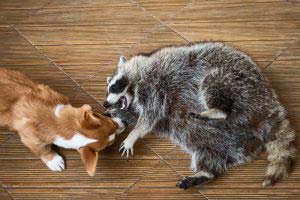As a pet owner, you always want what is best for your furry family members. But with such a vast wildlife population in Florida, there are specific risk factors that can significantly affect your pets’ health and safety — and they might be closer than you think. Take a look at some of the issues your cat, dog, or other household animals may face when uninvited critters find a way onto your property.

Wild Animals Can Interrupt Your Pets Mealtime
Like most pet owners, you know how much food to feed your animals and have a regular routine with portioned pet meals. Where you feed your furry family members and how diligent you are about cleaning up afterward, however, can affect whether your pets end up sharing a plate with wild animals.
In fact, there’s a chance that your animals could become undernourished due to food theft by raccoons, rats, and other critters if you leave pet bowls and food crumbs out for too long. That’s because other animals will see a pattern of leftover pet food and learn which times of day and locations they can revisit to find more. As a result, uninvited critters could contaminate your pets’ food bowls or start eating directly from them.
Unwanted Wild Animals Confrontations are Dangerous for your Pets
Wild animals are a risk to pets of all sizes, but small dogs and cats are especially vulnerable to non-domesticated critters. If your curious pet finds a new potential playmate in the yard or gets in a confrontation with a wandering critter, the situation could quickly turn into something serious. The spread of rabies, for example, is a significant risk factor of wild animal attacks that can be especially devastating if your furry friend isn’t up to date on vaccinations.
Wild Animals Can Bring Pesky Fleas and Ticks
If your pet likes to roam in the yard or if you like to take walks together around the neighborhood, you probably already check them for ticks on a regular basis. However, the chances you’ll find a tick in their fur gets much higher when other animals — especially wild ones — are involved. While some rodents and other animals feed on ticks, many carry them in their fur and wind up bringing them into your yard and home. Ticks and mites can be a burden on your pets, creating rashes and itchiness, but they can also carry diseases and create a range of health issues that are even more serious for your furry friends.
Wild Animals Can Cause Serious Medical Risks for your Pets
Rodents and other types of wild animals carry a multitude of diseases that may pose a threat to your pets. Keeping up with regular vaccinations is crucial to protecting your pets from diseases spread by wildlife. Because, if your cat, dog, or other household animal comes into contact with a non-domesticated critter — such as a raccoon, squirrel, or opossum — they could suffer from ailments and diseases such as:
- Rabies — Millions of animals die every year from rabies. The disease is commonly transmitted through an infected animal’s saliva, so all it takes is one bite for your furry family members to be exposed to it. Once infected, your pets may suffer from weakness, disorientation, and fever.
- Hantavirus — This potentially life-threatening disease is commonly found in mice and rats. Currently, there is no specific treatment or cure.
- Leptospirosis — Your pet can become infected with leptospirosis just by coming into contact with an infected animal’s urine. The animals that most commonly carry the disease include rats, mice, raccoons, skunks, and opossums.
- Lyme Disease — This bacterial infection often spreads from animal to animal through tick bites. Rashes and fever are some of the early warning signs that your pet has Lyme disease.
- Tuberculosis — While this disease is uncommon in dogs and cats, your pet can still develop tuberculosis after coming in contact with an infected animal. Symptoms can range from weight loss and diarrhea to fever and harsh coughing.
- Rat-Bite Fever — Generally transmitted by rodent bites, this life-threatening, acute, febrile illness can also be spread through bacteria in rat mucus and urine.
Let Orlando’s Wild Animal Removal Experts Protect Your Pets
The importance of keeping your family members — including your pets — away from wildlife is something you should always keep in mind. At Critter Control Orlando®, we understand you may not be able to constantly monitor your pets’ activity outside or keep a watchful eye on them while they play in the yard. Let us help you keep your property pest-free and protected from unwanted wild animals, so you don’t have to.
Rest easy knowing you and your family are safe from wildlife attack, contamination, and disease by calling your local animal removal experts at Critter Control® of Orlando. At the first sign of any unwanted animal in or around your home, our team of licensed technicians can be at your side with humane wild animal removal and relocation.






